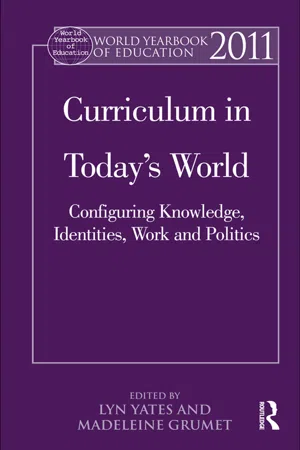
World Yearbook of Education 2011
Curriculum in Today's World: Configuring Knowledge, Identities, Work and Politics
- 254 pages
- English
- ePUB (mobile friendly)
- Available on iOS & Android
World Yearbook of Education 2011
Curriculum in Today's World: Configuring Knowledge, Identities, Work and Politics
About This Book
How do curriculum, conceptions of knowledge and the schooling experiences of young people engage the great issues of this tumultuous time? Curriculum is always influenced by the events that shape our world, but when testing and bench-marking preoccupy us, we can forget the world that is both the foundation and the object of curriculum. This edited volume brings together international contributors to analyze and reflect on the way the events of the last decade have influenced the curriculum in their countries. As they address nationalism in the face of economic globalisation, the international financial crisis, immigration and the culture of diaspora, they ask how national loyalties are balanced with international relationships and interests. They ask how the rights of women, and of ethnic and racial groups are represented. They ask what has changed about history and civics post 9/11, and they ask how countries that have experienced profound political and economic changes have addressed them in curriculum.
These interactions and changes are a subject of particular interest for an international yearbook in that they are almost always permeated by global movements and influenced by multinational bodies and practices. And as these essays show, in curriculum, global and international issues are explicitly or implicitly also about local and national interests and about how citizens engage their rights and responsibilities.
This volume brings together a new approach to perspectives on curriculum today and a new collection of insights into the changes from different parts of the world which discuss:
- How is the world represented in curriculum?
- How do responses to world events shape the stories we tell students about who they are and can be?
This book will be of great benefit to educational researchers and policy-makers, as well as undergraduate and postgraduate students.
Frequently asked questions
Information
Table of contents
- Cover Page
- Title Page
- Copyright Page
- Illustrations
- Contributors
- Series Editors’ Introduction
- Acknowledgements
- Introduction
- Part I: Curriculum and National/Global Identities
- Part II: Curriculum, the Economy and Work
- Part III: Curriculum and Knowledge
- Part IV: Curriculum Responses to Politics and Vulnerabilities
- Afterword